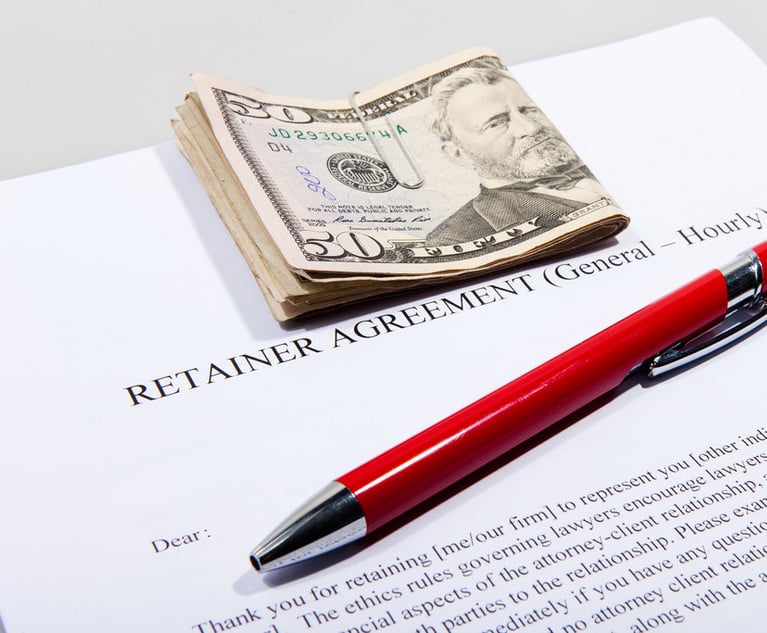Ford Wins a Round in Hotly-Contested Roof Crush Case With Sanctions Appeal
The Georgia Court of Appeals issued a one-sentence order denying an emergency motion to dismiss Ford's notice of appeal in a product liability wrongful death lawsuit involving a South Georgia couple who died in an F-250 Super Duty pickup truck rollover crash.
September 18, 2018 at 09:55 AM
5 minute read
 Judge Shawn Bratton, Gwinnett County State Court (Photo: John Disney/ALM)
Judge Shawn Bratton, Gwinnett County State Court (Photo: John Disney/ALM)
Ford Motor Co. has won a chance to appeal Gwinnett County State Court Judge Shawn Bratton's sanctions in a contentious roof crush case that ended in a mistrial.
The Georgia Court of Appeals issued a one-sentence order Monday saying the other side's emergency motion to dismiss Ford's notice of appeal is denied.
Lawyers on both sides declined to comment beyond the record. The briefs show Ford's team describing Bratton's sanctions as civil capital punishment and equating them with a contempt charge, which is appealable. Opposing counsel has called that strategy “nonsense” and a delaying tactic, asserting that Ford should not be allowed to appeal until the case can be tried again and a verdict reached.
The product liability wrongful death lawsuit was filed by the family of South Georgia farmers Melvin and Voncile Hill, who died in a rollover crash in their F-250 Super Duty pickup truck. The company is appealing Bratton's imposition of sanctions against Ford for what the judge called repeated violations of his orders. Bratton declared a mistrial in April after Ford's lead counsel took an expert witness into cause-of-death testimony that the judge had already ruled out. As punishment, Bratton precluded the company's defense against charges that it knowingly made a roof that was dangerously weak and deadly in a foreseeable rollover crash.
Ford said in a notice of appeal that Bratton's sanction is “in substance, intention, and effect, an order holding defendant in contempt of the court and is therefore directly appealable” under Georgia law.
“The imposition of impermissible death-penalty contempt sanctions, violating basic due process rights by adjudicating a controversy not based on the merits, constitutes an exceptional case justifying interlocutory review of the order, particularly in light of the trial court's blanket refusal to certify that or any order for immediate review—a practice consistently and without exception followed with each and every certificate of immediate review requested by Ford,” the company said in its notice of appeal.
Ford further reasoned that, if the sanctions order can be appealed, then so can “all prior orders and rulings that may affect the proceedings below.” Thus the company announced in the notice that it is also appealing 14 other orders by Bratton, saying they “and many others” are “reviewable in the same manner as a final order.”
Ford's issues with the judge include Bratton preventing the company from apportioning fault to the driver, partly because he tested positive for “numerous prescription drugs with significant side effects.” Ford objected to being prevented from making an issue of seatbelt use: Although witnesses said the Hills were wearing their seatbelts, Ford suggested they may not have had the shoulder portion of their belts in proper position. Ford also took issue with Bratton's denial of its request for recusal based on alleged bias in favor of the Hills.
Ford asked the clerk to “omit nothing from the record on appeal” and designate that all transcripts, pleadings, papers, exhibits, depositions and other materials before and during the three-week trial be sent as part of the record.
The Georgia Court of Appeals has jurisdiction over the appeal, Ford asserted, “because this case does not involve matters within the exclusive jurisdiction of the Supreme Court of Georgia.” Ford's appellate attorneys are William Withrow Jr., Pete Robinson and James Manley at Troutman Sanders. They replaced Dentons partner Randy Evans after Evans left the firm to become a U.S. ambassador to Luxembourg.
Ford's lead trial counsel is D. Alan Thomas of Huie Fernambucq & Stewart in Birmingham, Alabama, working with Paul Malek of the same firm. The team includes Michael Eady of Thompson Coe Cousins & Irons of Austin, Texas; and Atlanta lawyers Michael Boorman and Philip Henderson of Huff, Powell & Bailey.
Counsel for Kim and Adam Hill, who brought the suit on behalf of their deceased parents, filed a request for special setting of a new trial date and opposition to what they claim are Ford's attempts to delay it.
The Hills' lead counsel is Jim Butler of Butler Wooten & Peak of Columbus and Atlanta. Butler's legal team includes Gerald Davidson Jr. of Mahaffey Pickens Tucker in Lawrenceville; Brandon Peak, David Rohwedder, Christopher McDaniel and Ramsey Prather of Butler Wooten; and Michael Gray of Walker, Hulbert, Gray & Moore in Perry. The Butler team has also added appellate lawyers Michael Terry and Frank Lowrey IV of Bondurant Mixson & Elmore.
The Hill team said in its filing that Ford's latest action “makes it even more clear that Ford intends to try to delay retrial as much as possible by attempted unauthorized appeals.”
The Butler team said the Hills “have a right to get a trial and a verdict” and cited another case the firm tried, Gibson v. Ford, in which the firm claims the company's lawyers delayed the trial for five years with preverdict appeals. That case finally ended in 2005 with a $13 million verdict. “Plaintiffs are opposed to piecemeal appellate review and should not be punished by further delay as a result of Ford's and Ford's lawyers' reprehensible behavior,” the Hill lawyers said in a brief. They also quoted Bratton's July 19 sanctions order: “Ford's ability to appeal the court's rulings with which it took exception was within arm's length. Upon verdict, likely days away, all rulings would have been directly appealable.”
This content has been archived. It is available through our partners, LexisNexis® and Bloomberg Law.
To view this content, please continue to their sites.
Not a Lexis Subscriber?
Subscribe Now
Not a Bloomberg Law Subscriber?
Subscribe Now
NOT FOR REPRINT
© 2025 ALM Global, LLC, All Rights Reserved. Request academic re-use from www.copyright.com. All other uses, submit a request to [email protected]. For more information visit Asset & Logo Licensing.
You Might Like
View All
40% Contingency: A New Ruling Just Cost This Plaintiff Team $827K in Legal Fees
6 minute read
'David and Goliath' Dispute Between Software Developers Ends in $24M Settlement

Trending Stories
- 1President-Elect Donald Trump Sentenced to Unconditional Discharge
- 2JCPenney Customer's Slip-and-Fall From Bodily Substance Suit Best Left for a Jury to Decide, Judge Rules
- 3Products Liability: The Absence of Other Similar Claims—a Defense or a Misleading Effort to Sway a Jury?
- 4529 Accounts Are Not Your Divorce Piggybank
- 5Meta Hires Litigation Strategy Chief, Tapping King & Spalding Partner Who Was Senior DOJ Official in First Trump Term
Who Got The Work
Michael G. Bongiorno, Andrew Scott Dulberg and Elizabeth E. Driscoll from Wilmer Cutler Pickering Hale and Dorr have stepped in to represent Symbotic Inc., an A.I.-enabled technology platform that focuses on increasing supply chain efficiency, and other defendants in a pending shareholder derivative lawsuit. The case, filed Oct. 2 in Massachusetts District Court by the Brown Law Firm on behalf of Stephen Austen, accuses certain officers and directors of misleading investors in regard to Symbotic's potential for margin growth by failing to disclose that the company was not equipped to timely deploy its systems or manage expenses through project delays. The case, assigned to U.S. District Judge Nathaniel M. Gorton, is 1:24-cv-12522, Austen v. Cohen et al.
Who Got The Work
Edmund Polubinski and Marie Killmond of Davis Polk & Wardwell have entered appearances for data platform software development company MongoDB and other defendants in a pending shareholder derivative lawsuit. The action, filed Oct. 7 in New York Southern District Court by the Brown Law Firm, accuses the company's directors and/or officers of falsely expressing confidence in the company’s restructuring of its sales incentive plan and downplaying the severity of decreases in its upfront commitments. The case is 1:24-cv-07594, Roy v. Ittycheria et al.
Who Got The Work
Amy O. Bruchs and Kurt F. Ellison of Michael Best & Friedrich have entered appearances for Epic Systems Corp. in a pending employment discrimination lawsuit. The suit was filed Sept. 7 in Wisconsin Western District Court by Levine Eisberner LLC and Siri & Glimstad on behalf of a project manager who claims that he was wrongfully terminated after applying for a religious exemption to the defendant's COVID-19 vaccine mandate. The case, assigned to U.S. Magistrate Judge Anita Marie Boor, is 3:24-cv-00630, Secker, Nathan v. Epic Systems Corporation.
Who Got The Work
David X. Sullivan, Thomas J. Finn and Gregory A. Hall from McCarter & English have entered appearances for Sunrun Installation Services in a pending civil rights lawsuit. The complaint was filed Sept. 4 in Connecticut District Court by attorney Robert M. Berke on behalf of former employee George Edward Steins, who was arrested and charged with employing an unregistered home improvement salesperson. The complaint alleges that had Sunrun informed the Connecticut Department of Consumer Protection that the plaintiff's employment had ended in 2017 and that he no longer held Sunrun's home improvement contractor license, he would not have been hit with charges, which were dismissed in May 2024. The case, assigned to U.S. District Judge Jeffrey A. Meyer, is 3:24-cv-01423, Steins v. Sunrun, Inc. et al.
Who Got The Work
Greenberg Traurig shareholder Joshua L. Raskin has entered an appearance for boohoo.com UK Ltd. in a pending patent infringement lawsuit. The suit, filed Sept. 3 in Texas Eastern District Court by Rozier Hardt McDonough on behalf of Alto Dynamics, asserts five patents related to an online shopping platform. The case, assigned to U.S. District Judge Rodney Gilstrap, is 2:24-cv-00719, Alto Dynamics, LLC v. boohoo.com UK Limited.
Featured Firms
Law Offices of Gary Martin Hays & Associates, P.C.
(470) 294-1674
Law Offices of Mark E. Salomone
(857) 444-6468
Smith & Hassler
(713) 739-1250







